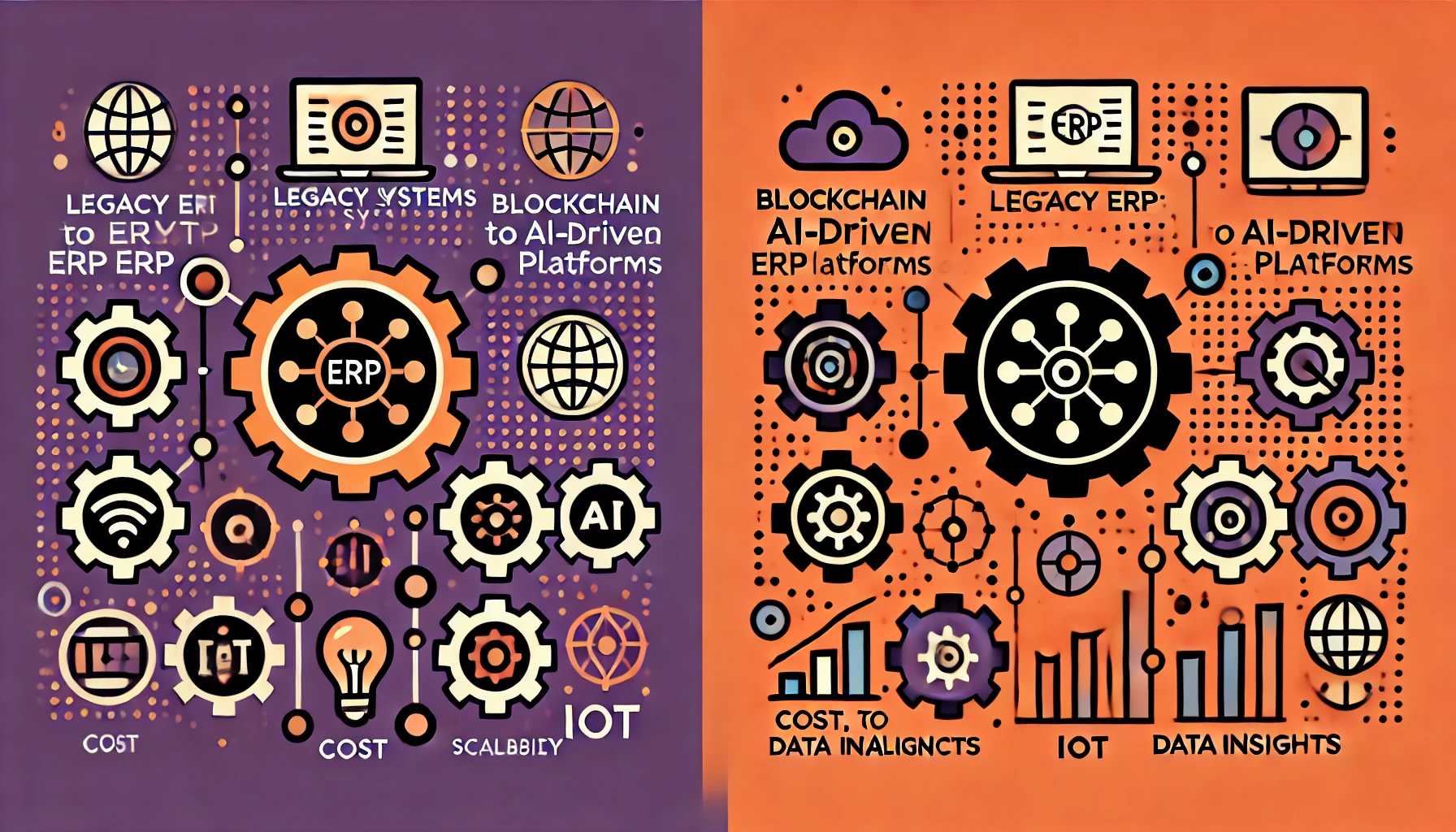AI-Driven
Enterprise Resource Planning (ERP) systems have become indispensable tools for businesses seeking to manage operations efficiently. Over the decades, ERP has undergone significant transformations, evolving from cumbersome legacy systems to intelligent, AI-driven platforms that define The Future of ERP Systems.
This blog delves into the journey of ERP technology, highlighting its milestones, innovations, and the promising future it holds for organizations worldwide.
Table of Contents
ToggleThe Legacy ERP Era
In its infancy, ERP systems were massive, on-premise software solutions designed to integrate core business processes such as finance, inventory, and manufacturing. Known as legacy ERP systems, these platforms were groundbreaking at the time but came with limitations.
Characteristics of Legacy ERP Systems:
- High Initial Costs: Expensive infrastructure and licensing fees made ERP adoption exclusive to large corporations.
- Lack of Flexibility: Customization was limited, requiring businesses to adapt their workflows to fit the software.
- On-Premise Dependency: Restricted access to systems tied to physical locations, hindering remote work capabilities.
- Manual Data Handling: Relied on significant manual input, increasing the risk of human error and inefficiency.
Despite these limitations, legacy ERP systems laid the foundation for modern ERP advancements, proving the value of integrated business management.
The Shift to Cloud ERP Solutions
The advent of cloud computing revolutionized ERP systems. Businesses no longer needed to rely on bulky on-premise solutions, as cloud ERP introduced unprecedented accessibility and scalability.
Benefits of Cloud ERP:
- Cost Efficiency: Eliminated the need for expensive hardware, offering subscription-based pricing models.
- Remote Access: Enabled users to access data and processes from anywhere, fostering collaboration and remote work.
- Real-Time Data: Provided live updates and insights, empowering businesses to make data-driven decisions.
- Easy Upgrades: Vendors handled updates, ensuring systems remained current without burdening internal IT teams.
Cloud ERP became a catalyst for innovation, paving the way for smarter, faster, and more intuitive systems.

The Role of AI and Automation in Modern ERP Systems
As businesses sought greater efficiency, The Future of ERP Systems emerged with the integration of artificial intelligence (AI) and automation. These technologies transformed ERP from a tool for process management into a driver of innovation and growth.
Key AI-Driven Features in ERP:
- Predictive Analytics: AI algorithms analyze historical data to forecast trends, enabling proactive decision-making.
- Process Automation: Reduces manual tasks, such as data entry and invoice processing, freeing up employees for strategic initiatives.
- Chatbots and Virtual Assistants: Provide real-time support to users, improving efficiency and user experience.
- Enhanced Security: AI-powered systems detect anomalies and prevent cybersecurity threats.
AI integration is redefining the capabilities of ERP, allowing businesses to stay ahead in an increasingly competitive landscape.
Emerging Trends Shaping The Future of ERP Systems
ERP technology continues to evolve, driven by innovations that address the changing needs of businesses. Here are some key trends to watch:
- Industry-Specific ERP Solutions: Businesses are shifting toward ERP systems tailored to their unique requirements, such as healthcare, retail, and manufacturing. These solutions streamline processes while meeting industry compliance standards.
- Blockchain Integration: Blockchain enhances data security and transparency, making it a valuable addition to ERP systems, particularly in supply chain management.
- Internet of Things (IoT) Connectivity: IoT devices feed real-time data into ERP systems, improving inventory tracking, equipment maintenance, and operational efficiency.
- Hyperautomation: Combines AI, machine learning, and robotic process automation (RPA) to automate end-to-end workflows, maximizing productivity.
- User-Centric Design: Future ERP systems prioritize intuitive interfaces and customization options, ensuring users can navigate platforms with ease.
Challenges in Adopting Next-Generation ERP Systems
While the advancements in ERP are exciting, businesses may face challenges during the transition:
- High Implementation Costs: AI-driven ERP systems can require substantial upfront investments.
- Data Migration Issues: Transferring data from legacy systems to modern platforms may pose technical challenges.
- Change Management: Employees may resist adopting new systems, emphasizing the need for comprehensive training and support.
Organizations must work with experienced ERP partners and strategists to navigate these hurdles effectively.

Why Businesses Need an ERP Strategist
Adopting and optimizing ERP systems requires careful planning and expertise. An ERP strategist plays a pivotal role in guiding businesses through this process by:
- Analyzing Business Needs: Assessing operational pain points to recommend the most suitable ERP solution.
- Planning Seamless Integration: Ensuring the new ERP system integrates seamlessly with existing tools and workflows.
- Enhancing User Adoption: Developing training programs to familiarize employees with the system and its features.
- Driving Long-Term ROI: Monitoring system performance and recommending upgrades or enhancements as needed.
With the support of an ERP strategist, businesses can maximize the value of their ERP investments and stay competitive in their industries.
Conclusion
From legacy systems to AI-driven platforms, The Future of ERP Systems is defined by innovation, scalability, and efficiency. As businesses embrace advanced technologies like AI, IoT, and blockchain, ERP systems are becoming more than just management tools, they’re transforming into strategic assets.
For organizations seeking to thrive in a digital-first world, staying ahead of ERP trends and working with an ERP strategist is essential. By leveraging cutting-edge ERP solutions, businesses can streamline operations, enhance decision-making, and unlock new opportunities for growth.




